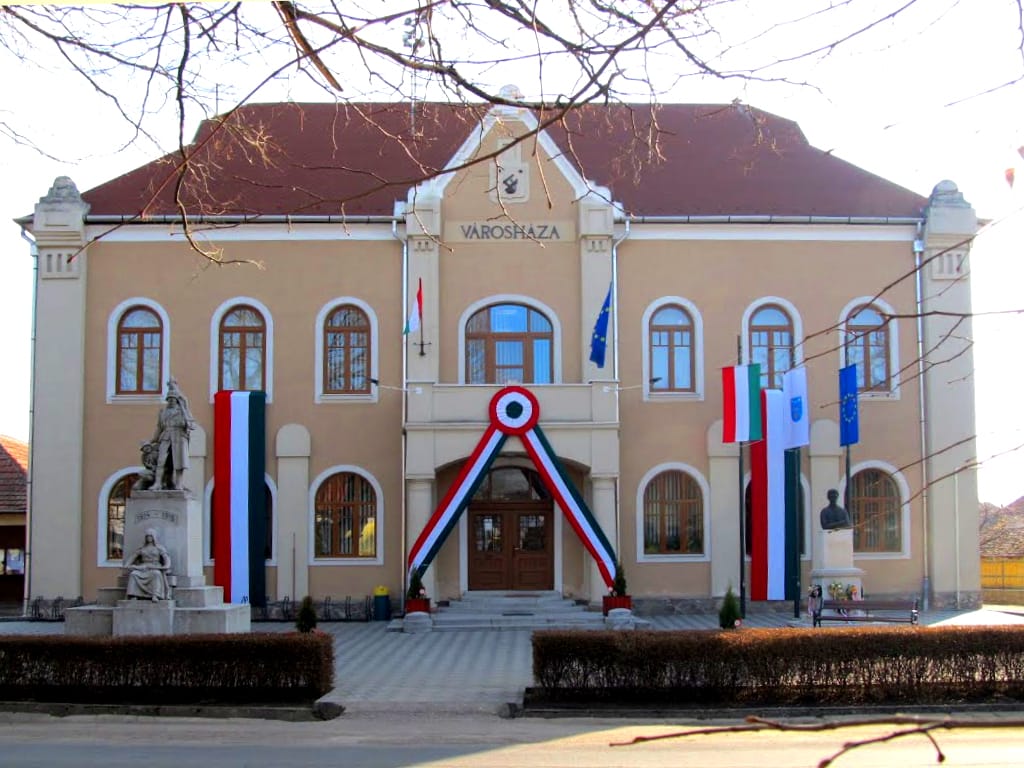I’m writing this from the terrace of our little winehouse, with a fan working double-time and my laptop precariously balanced between coffee and sunscreen. It’s another scorcher in the Balaton Highlands, but a cool front is (thankfully) on its way. I’m heading back to Budapest tomorrow for a few days of meetings, but I wanted to take a moment to share a story that, frankly, has been sitting with me for a couple of days.
The Hungarian property law Mezőkeresztes just enacted is officially called the Local Identity Protection Law – or in Hungarian, Helyi Önazonosság Védelméről Szóló Törvény. You might see it referred to in the press as the “Local Identity Protection Law,” though it now carries very real implications for anyone involved in buying or selling homes here.
The law was meant to protect small-town character and limit speculative investment. But its first real test case didn’t happen in a tourist hub or investor hotspot. It’s happening in Mezőkeresztes – a shrinking town in Borsod-Abaúj-Zemplén County. And what’s emerged from this case raises important, and at times uncomfortable, questions.
What Is This Law?
Hungary enacted its property law in July 2025, allowing municipalities to pass local ordinances that require buyers to submit all sale contracts directly to the town council. A local committee reviews the contract and either approves the buyer or chooses to purchase the property on the same terms.
The law was pitched as a way to preserve community character, avoid overdevelopment, and protect “local identity.” But it’s broad. Towns can choose to apply it however they see fit – and Mezőkeresztes chose to act first.
Why Mezőkeresztes?
This isn’t a Balaton-side village battling Airbnb speculators. Mezőkeresztes has seen its population steadily decline for years. According to HVG, the town has only 3 to 15 property transactions per year. Prices remain low, even though it’s near Mezőkövesd and the M3 motorway.
The ordinance passed on 27 June 2025 and took effect 1 July. Now, the local Financial and Economic Committee must review and approve every sale contract in Mezőkeresztes before completion. They have the power to approve or to pre-emptively purchase on behalf of the town. And while the text of the ordinance references protecting tradition and local ties, interviews with residents and past actions by the mayor suggest another motivation.
What Residents Are Saying
In 2016, Mayor János Majoros published an open letter urging residents not to sell homes below market value to Roma families. That letter is public record. Fast forward to this year, and reports by Népszava have documented growing concern among local Roma residents that the new ordinance is an effort to exclude them.
One resident told the paper:
“Nagy okosan nem írták bele a szövegbe, de ez a cigányok miatt van… mostantól majd a polgármester mondja meg, ki vehet házat a városban és ki nem.”
“They didn’t write it into the text, but it’s because of the Roma… from now on the mayor decides who can buy a house in town.”
Another recounted that a Roma relative was told they could only purchase a property in the neighbouring village of Szentistván.
Mayor Majoros, for his part, denies any discriminatory intent. He told Népszava:
“Nincs személyes, egyeseket kirekesztő és másokat előnybe hozó motívuma … a településkép megőrzése és a hagyományok ápolása miatt.”
“There is no personal motive to exclude some and favour others… it is to preserve the town’s image and traditions.”
He also pointed to a municipal programme where the town buys run-down homes and resells them at cost to young local couples. The municipality can now intervene before a property deteriorates – even if the seller isn’t asking for help.

Mezőkeresztes Town Hall, where the first local ordinance under Hungary’s new property law was passed.
(Source: HVG)
Buying Property in Mezőkeresztes: Buyers and Sellers
Thinking about buying property in Mezőkeresztes? There’s no central list of which towns have adopted the law. If you’re buying in Hungary, especially in a smaller settlements, you’ll need to:
- Check the town website for rendelet (ordinance) updates
- Look for határozatok (resolutions) or jegyzőkönyv (minutes)
- Contact the jegyző (town clerk) directly
For sellers, it means any transaction can now be delayed or overridden by the local authority – even if the buyer is Hungarian. The national government insists the law prohibits ethnic discrimination, but no independent oversight body ensures fair implementation.
What the Mezőkeresztes Case Reveals
What’s happened around buying property in Mezőkeresztes might not be what lawmakers intended. But it could be exactly what many local councils were hoping for. A legal, administrative way to regain control over who moves in, and who stays out.
The mayor says it’s about tradition. Some residents say it’s about something else entirely. The truth, as always, is more complicated.
From where I’m sitting – literally, on a sun-bleached terrace with the cicadas buzzing and the Wi-Fi holding on for dear life, I’m struck by how quickly a policy meant to protect can start to exclude. This law has only just begun to ripple across Hungary, but already it’s becoming clear: these aren’t just bureaucratic decisions. They’re deeply human ones, with real consequences.
What happens next isn’t just about Mezőkeresztes. It’s about what kind of Hungary we’re building, one town at a time.
Want the full backstory?
For a complete look at how Hungary’s Településvédelmi törvény (Local Identity Protection Law) came to be, read my full series:
- Part 1:
Hungary Property Law 2025 - Part 2:
Hungary Property Law: Identity Protection - Part 3:
Hungary Identity Protection Property Law - Part 4:
Hungary Property Law Impact - Part 5:
Hungary New Property Law Is Here
Need help navigating Hungary’s property system?
My book HOW TO HUNGARY: Budapest & Beyond includes practical guides, real stories, and over 500 verified resources to help you make informed decisions—especially when the rules keep changing. Click here to learn more.

Anikó Woods is a Canadian-Hungarian writer, technology specialist, and digital strategist who swapped Toronto traffic for Hungarian bureaucracy. She’s the creator of HOW TO HUNGARY: Budapest & Beyond. Since moving to Hungary in 2017, she’s been deep in the paperwork trenches – fact-checking, interviewing experts, and helping others make sense of the madness. Her writing turns chaos into clarity, with a few laughs (and wine recommendations) along the way.

0 Comments